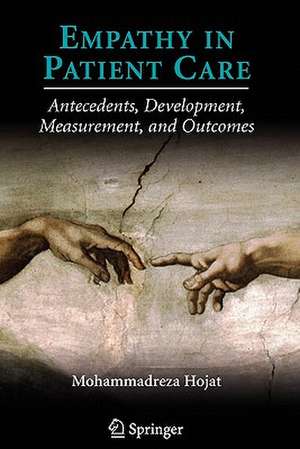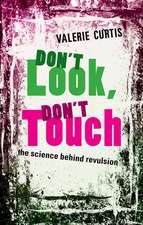Empathy in Patient Care: Antecedents, Development, Measurement, and Outcomes
Autor Mohammadreza Hojaten Limba Engleză Paperback – 28 oct 2010
| Toate formatele și edițiile | Preț | Express |
|---|---|---|
| Paperback (1) | 653.91 lei 6-8 săpt. | |
| Springer – 28 oct 2010 | 653.91 lei 6-8 săpt. | |
| Hardback (1) | 723.21 lei 6-8 săpt. | |
| Springer – noi 2006 | 723.21 lei 6-8 săpt. |
Preț: 653.91 lei
Preț vechi: 688.33 lei
-5% Nou
Puncte Express: 981
Preț estimativ în valută:
125.12€ • 130.99$ • 103.53£
125.12€ • 130.99$ • 103.53£
Carte tipărită la comandă
Livrare economică 05-19 aprilie
Preluare comenzi: 021 569.72.76
Specificații
ISBN-13: 9781441922151
ISBN-10: 1441922156
Pagini: 320
Ilustrații: XXXVI, 296 p.
Dimensiuni: 155 x 235 x 17 mm
Greutate: 0.45 kg
Ediția:Softcover reprint of hardcover 1st ed. 2007
Editura: Springer
Colecția Springer
Locul publicării:New York, NY, United States
ISBN-10: 1441922156
Pagini: 320
Ilustrații: XXXVI, 296 p.
Dimensiuni: 155 x 235 x 17 mm
Greutate: 0.45 kg
Ediția:Softcover reprint of hardcover 1st ed. 2007
Editura: Springer
Colecția Springer
Locul publicării:New York, NY, United States
Public țintă
ResearchDescriere
Human beings are designed by evolution to form meaningful interpersonal relationships through verbal and nonverbal communication. This principle is the same whether the individual is male or female; an infant, a child, an adolescent, or an adult; or healthy or sick. The theme that empathic human connections are beneficial to the body and mind underlies all 12 chapters of this book, in which empathy is viewed from a multidisciplinary perspective that includes evolution; neuropsychology; clinical, social, developmental, and educational psychology; and health care delivery and education. Some theoretical aspects of antecedents, development, and outcomes of empathy are discussed, and relevant studies and empirical findings are presented in support of the theoretical discussion.
The following comments have been made about this book by experts and scholars:
"Dr. Hojat wisely provides an agenda for future research ranging from selecting prospective medical students for their empathy to evaluating the neurobiological components of empathy and compassion. Hojat’s utopia wisely provides goals which medical practitioners and teachers can ponder and try to reach for in their daily activities. We are in his debt."
Howard Spiro, M.D., Emeritus Professor of Medicine, Yale University School of Medicine (Excerpted from the book’s foreword)
"This book is unique in combining an encyclopedic overview of empathy with a fine-grained, precise way of measuring it. Clinicians, researchers, students, and educators will find in this book both a resource for work already done and a blueprint for what still needs to be done."
Herbert Adler, M.D., Ph.D., Clinical Professor of Psychiatry and Human Behavior, Jefferson Medical College
"This book should be essential reading for all those engaged in medical education. The author writes clearly and covers the broad area of empathy, with theoretical depth and practical suggestions based on his own research and that of others. He is a foremost leader in this field and his book sets a standard for all to follow."
Marvin Zuckerman, Ph.D., Emeritus Professor of Psychology, University of Delaware
"This book is a scholarly achievement in the field. All will benefit from its comprehensiveness."
Joseph Gonnella, M.D., Emeritus Dean and Distinguished Professor of Medicine, Jefferson Medical College
"This book is an outstanding contribution to the scholarly and clinical understanding of empathy. Most importantly, it combines conceptual rigor with an empirical foundation. Dr. Hojat has devoted himself to developing ways of measuring empathy, and in this book he combines his own findings with an encyclopedic knowledge of other relevant empirical work. This book will be important for any serious student of empathy, including medical educators who are seeking to truly transform professional training."
Jodi Halpern, M.D., Ph.D., Associate Professor of Bioethics and Medical Humanities, University of California, Berkeley. Author of "From Detached Concern to Empathy: Humanizing Medical Practice."
The following comments have been made about this book by experts and scholars:
"Dr. Hojat wisely provides an agenda for future research ranging from selecting prospective medical students for their empathy to evaluating the neurobiological components of empathy and compassion. Hojat’s utopia wisely provides goals which medical practitioners and teachers can ponder and try to reach for in their daily activities. We are in his debt."
Howard Spiro, M.D., Emeritus Professor of Medicine, Yale University School of Medicine (Excerpted from the book’s foreword)
"This book is unique in combining an encyclopedic overview of empathy with a fine-grained, precise way of measuring it. Clinicians, researchers, students, and educators will find in this book both a resource for work already done and a blueprint for what still needs to be done."
Herbert Adler, M.D., Ph.D., Clinical Professor of Psychiatry and Human Behavior, Jefferson Medical College
"This book should be essential reading for all those engaged in medical education. The author writes clearly and covers the broad area of empathy, with theoretical depth and practical suggestions based on his own research and that of others. He is a foremost leader in this field and his book sets a standard for all to follow."
Marvin Zuckerman, Ph.D., Emeritus Professor of Psychology, University of Delaware
"This book is a scholarly achievement in the field. All will benefit from its comprehensiveness."
Joseph Gonnella, M.D., Emeritus Dean and Distinguished Professor of Medicine, Jefferson Medical College
"This book is an outstanding contribution to the scholarly and clinical understanding of empathy. Most importantly, it combines conceptual rigor with an empirical foundation. Dr. Hojat has devoted himself to developing ways of measuring empathy, and in this book he combines his own findings with an encyclopedic knowledge of other relevant empirical work. This book will be important for any serious student of empathy, including medical educators who are seeking to truly transform professional training."
Jodi Halpern, M.D., Ph.D., Associate Professor of Bioethics and Medical Humanities, University of California, Berkeley. Author of "From Detached Concern to Empathy: Humanizing Medical Practice."
Cuprins
Empathy in Human Relationships.- Definitions and Conceptualization.- Human Connection in Health and Illness.- An Evolutionary Perspective, Psycho-Socio-Physiology, Neuroanatomy, and Heritability.- Psychodynamics and Development.- Measurement of Empathy in the General Population.- Empathy in Patient Care.- A Definition and Key Features of Empathy in Patient Care.- The Jefferson Scale of Physician Empathy.- The Interpersonal Dynamics in Clinician–Patient Relationships.- Empathy as Related to Sex, Personal Qualities, Clinical Competence, and Career Choice.- Patient Outcomes.- Enhancement of Empathy.- Parting Thoughts: A Paradigm of Empathy and Future Directions.
Recenzii
From the reviews:
"Dr. Hojat wisely provides an agenda for future research ranging from selecting prospective medical students for their empathy to evaluating the neurobiological components of empathy and compassion. Hojat’s utopia wisely provides goals which medical practitioners and teachers can ponder and try to reach for in their daily activities. We are in his debt."
Howard Spiro, M.D., Emeritus Professor of Medicine, Yale University School of Medicine (Excerpted from the book’s foreword)
"This book is unique in combining an encyclopedic overview of empathy with a fine-grained, precise way of measuring it. Clinicians, researchers, students, and educators will find in this book both a resource for work already done and a blueprint for what still needs to be done."
Herbert Adler, M.D., Ph.D., Clinical Professor of Psychiatry and Human Behavior, Jefferson Medical College
"This book should be essential reading for all those engaged in medical education. The author writes clearly and covers the broad area of empathy, with theoretical depth and practical suggestions based on his own research and that of others. He is a foremost leader in this field and his book sets a standard for all to follow."
Marvin Zuckerman, Ph.D., Emeritus Professor of Psychology, University of Delaware
"This book is a scholarly achievement in the field. All will benefit from its comprehensiveness."
Joseph Gonnella, M.D., Emeritus Dean and Distinguished Professor of Medicine, Jefferson Medical College
"This book is an outstanding contribution to the scholarly and clinical understanding of empathy. Most importantly, it combines conceptual rigor with an empirical foundation. Dr. Hojat has devoted himself to developing ways of measuring empathy, and in this book he combines his own findings with an encyclopedic knowledge of other relevant empirical work. This book will be important for any serious student of empathy, including medical educators who are seeking to truly transform professional training."
Jodi Halpern, M.D., Ph.D., Associate Professor of Bioethics and Medical Humanities, University of California, Berkeley. Author of "From Detached Concern to Empathy: Humanizing Medical Practice."
"Mohammadreza Hojat, a prominent researcher in medical education, makes the case that empathy is not a mere abstraction but a psychological attribute that has concrete clinical benefits. … Empathy is placed in the contexts of biological, psychological, and developmental research, and its importance in the clinical encounter is forcefully laid out. … Hojat proposes several directions for future research and policy. … Among the strengths of this book are its thorough and up-to-date reviews of varied specialist literatures and its author’s consistently humanist voice." (Nick Haslam, The New England Journal of Medicine, April, 2007)
"Hojat presents an excellent compilation of research and theory regarding the doctor-patient relationship in general and the importance of connectedness and empathy in that relationship specifically. His book also models a rigorous research process for studying an ephemeral trait. … This important text has a place in every medical school. It also will be widely used in health services research because of the rigorous research process it models." (Mary Ann Cook, PsycCRITIQUES, Vol. 52 (20), 2007)
This carefully written discussion of empathy in patient care will be useful to those interested in any kind of practitioner-client relationship. … Thirty-nine pages provide references for this scholarly work. Summing Up: Recommended. Upper-level undergraduates and above." (M. K. Snooks, CHOICE, Vol. 44 (9), May, 2007)
"Dr. Hojat wisely provides an agenda for future research ranging from selecting prospective medical students for their empathy to evaluating the neurobiological components of empathy and compassion. Hojat’s utopia wisely provides goals which medical practitioners and teachers can ponder and try to reach for in their daily activities. We are in his debt."
Howard Spiro, M.D., Emeritus Professor of Medicine, Yale University School of Medicine (Excerpted from the book’s foreword)
"This book is unique in combining an encyclopedic overview of empathy with a fine-grained, precise way of measuring it. Clinicians, researchers, students, and educators will find in this book both a resource for work already done and a blueprint for what still needs to be done."
Herbert Adler, M.D., Ph.D., Clinical Professor of Psychiatry and Human Behavior, Jefferson Medical College
"This book should be essential reading for all those engaged in medical education. The author writes clearly and covers the broad area of empathy, with theoretical depth and practical suggestions based on his own research and that of others. He is a foremost leader in this field and his book sets a standard for all to follow."
Marvin Zuckerman, Ph.D., Emeritus Professor of Psychology, University of Delaware
"This book is a scholarly achievement in the field. All will benefit from its comprehensiveness."
Joseph Gonnella, M.D., Emeritus Dean and Distinguished Professor of Medicine, Jefferson Medical College
"This book is an outstanding contribution to the scholarly and clinical understanding of empathy. Most importantly, it combines conceptual rigor with an empirical foundation. Dr. Hojat has devoted himself to developing ways of measuring empathy, and in this book he combines his own findings with an encyclopedic knowledge of other relevant empirical work. This book will be important for any serious student of empathy, including medical educators who are seeking to truly transform professional training."
Jodi Halpern, M.D., Ph.D., Associate Professor of Bioethics and Medical Humanities, University of California, Berkeley. Author of "From Detached Concern to Empathy: Humanizing Medical Practice."
"Mohammadreza Hojat, a prominent researcher in medical education, makes the case that empathy is not a mere abstraction but a psychological attribute that has concrete clinical benefits. … Empathy is placed in the contexts of biological, psychological, and developmental research, and its importance in the clinical encounter is forcefully laid out. … Hojat proposes several directions for future research and policy. … Among the strengths of this book are its thorough and up-to-date reviews of varied specialist literatures and its author’s consistently humanist voice." (Nick Haslam, The New England Journal of Medicine, April, 2007)
"Hojat presents an excellent compilation of research and theory regarding the doctor-patient relationship in general and the importance of connectedness and empathy in that relationship specifically. His book also models a rigorous research process for studying an ephemeral trait. … This important text has a place in every medical school. It also will be widely used in health services research because of the rigorous research process it models." (Mary Ann Cook, PsycCRITIQUES, Vol. 52 (20), 2007)
This carefully written discussion of empathy in patient care will be useful to those interested in any kind of practitioner-client relationship. … Thirty-nine pages provide references for this scholarly work. Summing Up: Recommended. Upper-level undergraduates and above." (M. K. Snooks, CHOICE, Vol. 44 (9), May, 2007)
Notă biografică
Mohammadreza Hojat, Ph.D. is Research Professor of Psychiatry and Human Behavior, and Director of the Jefferson Longitudinal Study of Medical Education at Jefferson Medical College of Thomas Jefferson University in Philadelphia, Pennsylvania. He was born in Mashhad, Iran, received his bachelor’s degree from Pahlavi University (currently University of Shiraz), his master’s degree from the University of Tehran in Iran, and his doctoral degree from the University of Pennsylvania. Dr. Hojat is a licensed psychologist in the Commonwealth of Pennsylvania, and has published more than 170 articles in peer-reviewed journals on educational, psychological, and social issues. Dr. Hojat is a manuscript referee for several American and European professional journals, and has served as a co-editor of two books: Loneliness: Theory, Research, and Applications (Sage, 1987), and Assessment Measures in Medical School, Residency, and Practice: The Connections (Springer, 1993).
Textul de pe ultima copertă
Empathy has long been recognized as a key element of the healing professions. Yet it is not always clear how to define the concept, how to measure it, whether there are effective methods to enhance empathy , or whether empathy really helps make treatment more effective. Drawing on evolutionary research, neurological findings, developmental and psychodynamic perspectives, and systems theory, Empathy in Patient Care explains why this human quality is essential to positive health outcomes—and how it can be measured and how professionals can benefit from its enhancement.
Dr. Hojat proceeds from theoretical constructs of empathy as a core ingredient of human relationships to analyze the nuanced roles it plays in the therapeutic dyad. Twelve insightful chapters define empathy as it develops during the crucial early months of life, relate it to specific biopsychosocial aspects of health, and place empathy firmly in the context of patient care:
-Findings linking higher levels of clinician empathy to a more accurate diagnosis, more positive treatment outcomes, and better patient compliance
-The World Health Organization’s definition of health linked to empathy in patient care
-Descriptions of effective science-based empathy-building programs
-Salient discussion of empathy-related gender and career choice issues as reflected in clinicians’ practice styles
-Training issues, from obstacles to empathy in medical school to whether empathy should be considered in admissions decisions
-An in-depth grounding in the Jefferson Scale of Physician Empathy, complete with specific versions of this measure for practitioners, students, and patients.
Written with great professional and personal vision, Empathy in Patient Care opens its readers—physicians and nurses, psychologists, therapists and social workers, students and the faculty who work with them—to emerging, creative uses for this most basic human attribute.
"This book is unique in combining an encyclopedic overview of empathy with a fine-grained, precise way of measuring it. Clinicians, researchers, students, and educators will find in this book both a resource for work already done and a blueprint for what still needs to be done."
Herbert Adler, M.D., Ph.D., Clinical Professor of Psychiatry and Human Behavior, Jefferson Medical College.
Dr. Hojat proceeds from theoretical constructs of empathy as a core ingredient of human relationships to analyze the nuanced roles it plays in the therapeutic dyad. Twelve insightful chapters define empathy as it develops during the crucial early months of life, relate it to specific biopsychosocial aspects of health, and place empathy firmly in the context of patient care:
-Findings linking higher levels of clinician empathy to a more accurate diagnosis, more positive treatment outcomes, and better patient compliance
-The World Health Organization’s definition of health linked to empathy in patient care
-Descriptions of effective science-based empathy-building programs
-Salient discussion of empathy-related gender and career choice issues as reflected in clinicians’ practice styles
-Training issues, from obstacles to empathy in medical school to whether empathy should be considered in admissions decisions
-An in-depth grounding in the Jefferson Scale of Physician Empathy, complete with specific versions of this measure for practitioners, students, and patients.
Written with great professional and personal vision, Empathy in Patient Care opens its readers—physicians and nurses, psychologists, therapists and social workers, students and the faculty who work with them—to emerging, creative uses for this most basic human attribute.
"This book is unique in combining an encyclopedic overview of empathy with a fine-grained, precise way of measuring it. Clinicians, researchers, students, and educators will find in this book both a resource for work already done and a blueprint for what still needs to be done."
Herbert Adler, M.D., Ph.D., Clinical Professor of Psychiatry and Human Behavior, Jefferson Medical College.
Caracteristici
Discusses theoretical aspects of antecedents, development, and outcomes of empathy
Discusses relevant studies and empirical findings in support of the theoretical discussion
Includes appendices on: The Jefferson Scale of Physician Empathy (HP-Version); The Jefferson Scale of Physician Empathy (S-Version); and The Jefferson Scale of Patient’s Perceptions of Physician Empathy
Discusses relevant studies and empirical findings in support of the theoretical discussion
Includes appendices on: The Jefferson Scale of Physician Empathy (HP-Version); The Jefferson Scale of Physician Empathy (S-Version); and The Jefferson Scale of Patient’s Perceptions of Physician Empathy










![Promoting Psychological Well-Being in Children with Acute and Chronic Illness: A Step-By-Step Resource [With CD (Audio)]](https://i2.books-express.ro/bt/9781843109679/promoting-psychological-well-being-in-children-with-acute-and-chronic-illness.jpg)

